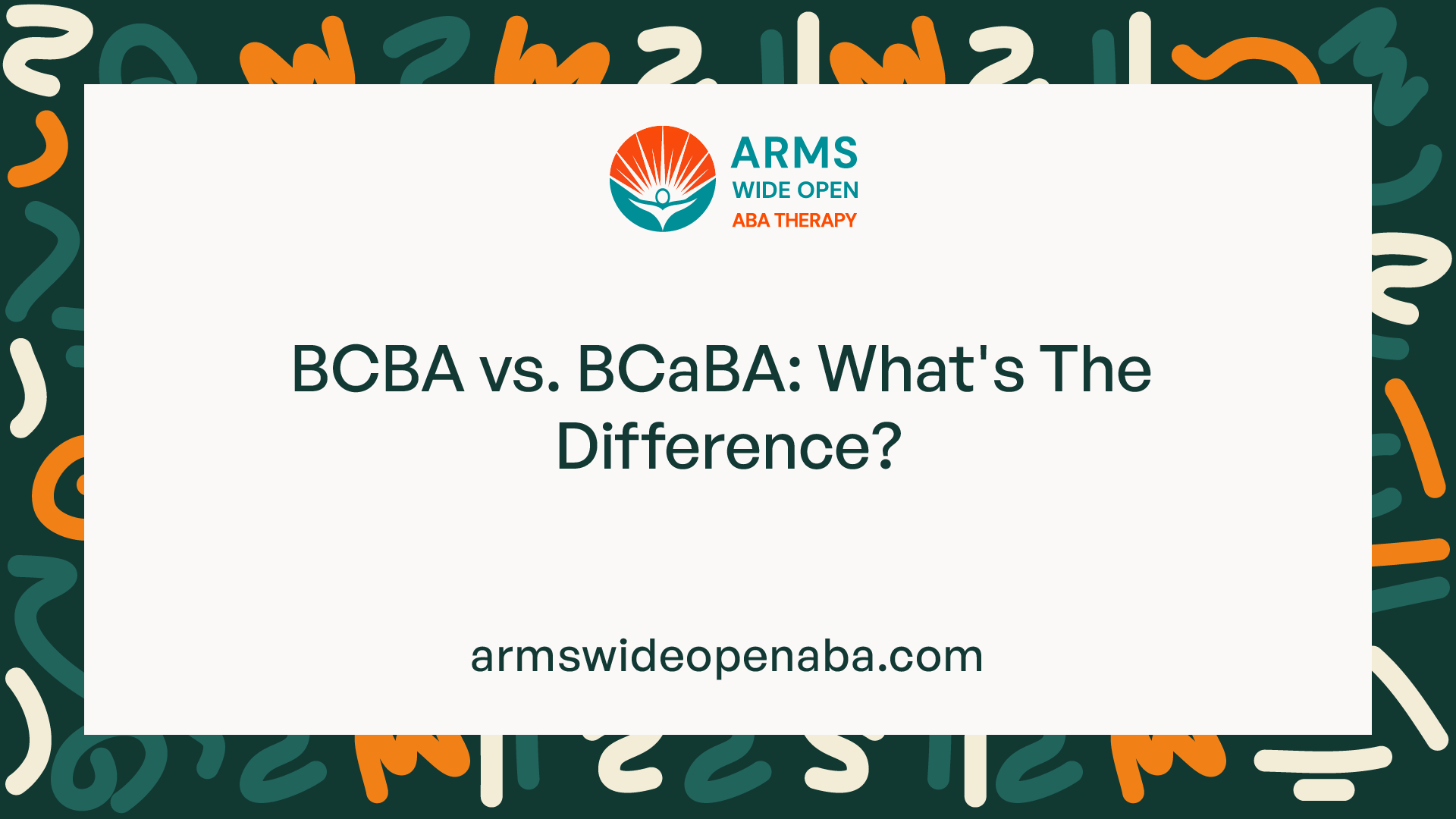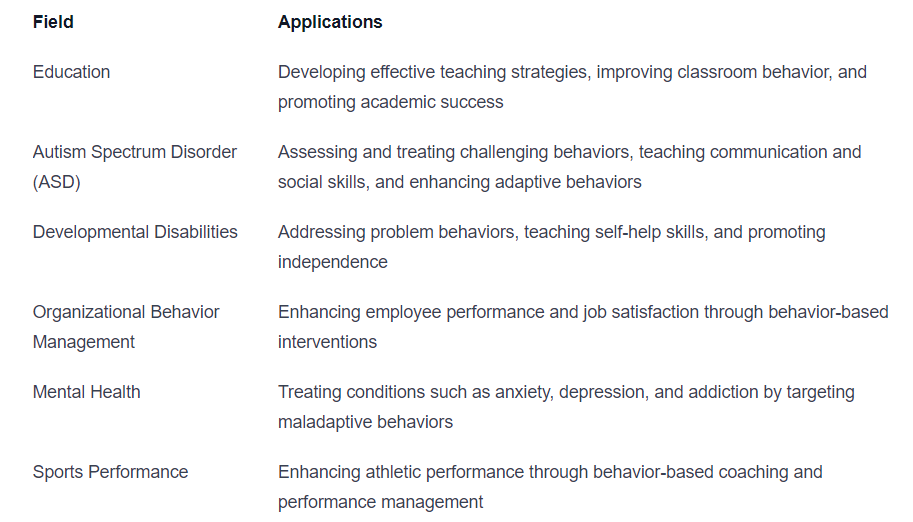BCBA vs. BCaBA: What's The Difference?
Demystifying BCBA vs. BCaBA: Choosing the right path in behavior analysis to advance your career. Uncover the differences today!

Behavior Analysis: An Overview
Behavior analysis is a field that focuses on understanding and modifying human behavior through scientific principles and techniques. By studying the relationship between behavior and its environmental factors, behavior analysts aim to bring about positive changes in individuals' lives. Let's explore what behavior analysis is and its applications.

What is Behavior Analysis?
Behavior analysis is the scientific study of behavior and its underlying causes. It involves systematically observing and measuring behavior, identifying functional relationships between behavior and the environment, and using this information to develop effective interventions.
Behavior analysts work to understand why individuals engage in certain behaviors, whether they are socially significant behaviors like communication skills or challenging behaviors that may interfere with daily functioning. By conducting assessments and analyzing data, behavior analysts can identify the antecedents (triggers) and consequences (reinforcements or punishments) that maintain behaviors, allowing them to develop intervention strategies.
Applications of Behavior Analysis
The principles of behavior analysis have a wide range of applications across various fields. Here are some areas where behavior analysis is commonly utilized:

Behavior analysis offers evidence-based strategies that can bring about meaningful changes in individuals' lives. By understanding the principles and techniques of behavior analysis, professionals can support individuals in reaching their goals and improving their overall quality of life.
Understanding BCBA and BCaBA
In the field of behavior analysis, two certifications play a significant role: BCBA (Board Certified Behavior Analyst) and BCaBA (Board Certified Assistant Behavior Analyst). These certifications are granted by the Behavior Analyst Certification Board (BACB) and indicate a professional's expertise and knowledge in behavior analysis. Let's take a closer look at each certification:
BCBA: Board Certified Behavior Analyst
A BCBA is a professional who has met the rigorous requirements set forth by the BACB. BCBA certification signifies a higher level of expertise and allows individuals to practice independently in the field of behavior analysis. BCBA practitioners are responsible for conducting assessments, designing behavior intervention plans, and overseeing the implementation of those plans by others.
To become a BCBA, individuals must meet specific educational and experience requirements. They must hold a graduate degree, complete approved coursework in behavior analysis, and accumulate supervised fieldwork hours. Additionally, passing the BCBA certification exam is a crucial step in obtaining this certification.
BCaBA: Board Certified Assistant Behavior Analyst
A BCaBA is a professional who works under the supervision of a BCBA. BCaBA certification demonstrates proficiency in behavior analysis and allows individuals to work directly with clients under the guidance of a BCBA. BCaBAs play a vital role in implementing behavior intervention plans and collecting data to monitor progress.
To become a BCaBA, individuals must meet specific educational requirements, which include completing approved coursework in behavior analysis. They must also accumulate supervised fieldwork hours and pass the BCaBA certification exam. BCaBAs work closely with BCBAs to provide valuable support in the implementation of behavior programs.
It's important to note that while BCaBAs work under the supervision of BCBAs, they still possess a solid foundation in behavior analysis and can make meaningful contributions to the field. BCBAs, on the other hand, have a higher level of expertise and are qualified to practice independently.
Understanding the distinctions between BCBA and BCaBA certifications is crucial when considering a career in behavior analysis. Both certifications offer valuable opportunities to make a positive impact on individuals' lives, but the level of responsibility and independence associated with each certification differs.
Educational Requirements
To become a certified behavior analyst, individuals must meet specific educational requirements. The educational requirements differ for those pursuing the BCBA (Board Certified Behavior Analyst) and BCaBA (Board Certified Assistant Behavior Analyst) certifications. Let's take a closer look at the educational requirements for each.
BCBA Educational Requirements
For individuals aspiring to become a BCBA, a master's degree in behavior analysis or a related field is required. The degree program must be accredited by the Behavior Analyst Certification Board (BACB) and consist of coursework that aligns with the BACB's Fourth Edition Task List.
In addition to completing the required coursework, aspiring BCBAs must also gain supervised practical experience. This includes completing a specified number of supervised fieldwork hours, typically ranging from 1,000 to 1,500 hours. These hours must be accrued within a defined timeframe, usually ranging from 12 to 18 months.
Once the educational and supervised experience requirements are met, individuals are eligible to sit for the BCBA certification exam. This rigorous exam assesses knowledge and competency in behavior analysis principles and practices.
BCaBA Educational Requirements
The educational requirements for individuals pursuing the BCaBA certification are slightly different. A bachelor's degree in behavior analysis or a related field is required, with coursework that aligns with the BACB's Fourth Edition Task List. The degree program must be accredited by the BACB to meet the educational requirements.
Similar to BCBAs, BCaBA candidates must also complete supervised practical experience. The required hours typically range from 500 to 1,000 hours and must be completed within a specified timeframe, usually ranging from 9 to 12 months.
Upon fulfilling the educational and supervised experience requirements, individuals can apply for the BCaBA certification exam. This exam evaluates knowledge and proficiency in behavior analysis principles and practices specific to the BCaBA scope of practice.
To summarize the educational requirements:

Meeting the educational requirements is an essential step towards becoming a certified behavior analyst. It ensures that individuals have acquired the necessary knowledge and practical experience to practice behavior analysis effectively and ethically.
Scope of Practice
When comparing the roles of a Board Certified Behavior Analyst (BCBA) and a Board Certified Assistant Behavior Analyst (BCaBA), it's important to understand their respective scopes of practice. Both professionals play vital roles in behavior analysis, but their responsibilities and level of autonomy differ.
BCBA Scope of Practice
As a BCBA, individuals have a broader scope of practice and greater independence in their work. They are qualified to:
- Conduct assessments and evaluations to identify behavioral needs and develop individualized treatment plans.
- Design, implement, and modify behavior intervention programs.
- Oversee the work of behavior technicians and other professionals.
- Provide behavior analytic services in various settings, such as schools, clinics, and homes.
- Collaborate with families, educators, and other professionals to ensure effective implementation of behavior plans.
- Monitor progress, collect data, and make data-based decisions to modify treatment strategies as needed.
BCBAs are responsible for the overall supervision and management of behavior analytic programs. They have the expertise to handle complex cases and address a wide range of behavioral issues. Their role extends beyond direct client contact, as they are also involved in training and supervising other professionals in the field.
BCaBA Scope of Practice
On the other hand, BCaBAs work under the supervision of BCBAs or other qualified professionals. Their scope of practice is narrower compared to BCBAs. BCaBAs have the capacity to:
- Implement behavior intervention plans developed by BCBAs or other qualified professionals.
- Collect data on behavior and treatment progress.
- Assist in the assessment and evaluation process.
- Provide direct behavior analytic services, such as conducting discrete trial training or implementing behavior reduction procedures.
BCaBAs work closely with BCBAs to deliver behavior analytic interventions. They require supervision and guidance from a BCBA to ensure the quality and effectiveness of their work. BCaBAs contribute to the implementation of behavior plans and play a valuable role in supporting individuals with behavioral challenges.
To summarize, BCBAs have a broader scope of practice and are qualified to oversee behavior analytic programs, conduct assessments, and develop treatment plans. BCaBAs, while working under supervision, provide direct behavioral services and support the implementation of behavior intervention plans. Both roles are essential in the field of behavior analysis, with BCBAs providing leadership and expertise, while BCaBAs contribute to the hands-on implementation of behavior interventions.
Supervision Requirements
In order to maintain the highest standards of practice and ensure the delivery of effective behavior analysis services, both BCBA (Board Certified Behavior Analyst) and BCaBA (Board Certified Assistant Behavior Analyst) professionals are required to fulfill specific supervision requirements. These requirements help to ensure that individuals pursuing certification receive appropriate guidance and support throughout their professional development.
BCBA Supervision Requirements
Aspiring BCBA professionals must complete a defined number of supervised experience hours before they are eligible to sit for the certification exam. The supervision requirements for BCBA candidates are as follows:

During the supervision process, BCBA candidates work under the direct supervision of a qualified supervisor who holds a current BCBA certification. The supervisor is responsible for overseeing the candidate's work, providing feedback, and ensuring adherence to ethical and professional standards.
BCaBA Supervision Requirements
Similar to BCBA professionals, individuals pursuing BCaBA certification are also required to complete supervised experience hours. The supervision requirements for BCaBA candidates are as follows:

During the supervision period, BCaBA candidates work under the direct supervision of a qualified supervisor who holds a current BCBA or BCaBA certification. The supervisor guides the candidate's work, provides feedback, and ensures that ethical and professional standards are met.
It's important to note that both BCBA and BCaBA supervision requirements necessitate direct, face-to-face supervision. Additionally, the supervisor must meet specific qualifications and be approved by the Behavior Analyst Certification Board (BACB).
By completing the required supervision hours, aspiring BCBA and BCaBA professionals gain valuable hands-on experience and receive mentorship from experienced practitioners. This supervision plays a critical role in shaping their skills and knowledge in behavior analysis, enabling them to provide effective and ethical behavior intervention services.
Career Opportunities and Advancement
As professionals in the field of behavior analysis, both BCBAs (Board Certified Behavior Analysts) and BCaBAs (Board Certified Assistant Behavior Analysts) have promising career opportunities and avenues for advancement. Let's explore the potential career paths for each certification.
Career Opportunities for BCBAs
BCBAs have a wide range of career opportunities across various settings, including schools, clinics, hospitals, and private practices. They play a crucial role in designing and implementing behavior intervention plans, conducting assessments, and providing behavior analytic services to individuals with diverse needs. Some common career paths for BCBAs include:
Career Opportunities for BCBAs
Behavior Analyst
Clinical Supervisor
Autism Specialist
School Consultant
Program Director
These are just a few examples of the career paths that BCBAs can pursue. The demand for qualified BCBAs continues to grow, providing ample opportunities for professional growth and advancement in the field of behavior analysis.
Career Opportunities for BCaBAs
While BCaBAs work under the supervision of BCBAs, they also have valuable career opportunities in the field of behavior analysis. BCaBAs typically work directly with clients, implementing behavior intervention plans and collecting data under the guidance of a BCBA. Some common career paths for BCaBAs include:
Career Opportunities for BCaBAs
Behavior Technician
Classroom Aide
Early Intervention Specialist
Case Manager
Behavioral Skills Trainer
BCaBAs often work in collaboration with BCBAs and other professionals, contributing to the overall success of behavior analytic programs. They provide vital support to individuals with behavioral challenges and contribute to positive behavior change.
Both BCBAs and BCaBAs have rewarding career opportunities that allow them to make a significant impact on the lives of individuals and their families. With experience and continued professional development, both certifications offer pathways for advancement and growth in the field of behavior analysis.
Choosing the Right Path
When considering a career in behavior analysis, it's essential to understand the differences between becoming a BCBA (Board Certified Behavior Analyst) and a BCaBA (Board Certified Assistant Behavior Analyst). Both paths offer opportunities to work in the field of behavior analysis and make a positive impact on individuals' lives. However, several factors can help you determine which path is the right fit for you.
Factors to Consider
Before pursuing certification in behavior analysis, it's important to consider the following factors:
- Education and Experience: BCBA requires a higher level of education and experience compared to BCaBA. Consider your educational background and the level of commitment you are willing to make in terms of time and resources.
- Level of Responsibility: BCBA holds a higher level of responsibility, as they are authorized to design behavior intervention plans, supervise BCaBAs and other professionals, and conduct behavioral assessments. BCaBAs work under the supervision of BCBAs and assist in implementing behavior intervention plans.
- Career Goals: Consider your long-term career goals and aspirations within the field of behavior analysis. If you are looking for more independence and leadership opportunities, becoming a BCBA might be the right path. If you prefer working in a supportive role under the supervision of a BCBA, a career as a BCaBA could be a good fit.
- Supervision Requirements: BCaBAs require supervision from a BCBA, while BCBAs may be responsible for supervising BCaBAs and other professionals. Consider your preferences and the level of supervision you are comfortable with.
Pursuing Certification in Behavior Analysis
Regardless of whether you choose to become a BCBA or a BCaBA, both paths require dedication and commitment to the field of behavior analysis. Here are the general steps to pursue certification:
- Education: Complete the required coursework in behavior analysis from an accredited institution. For BCBA, a master's degree or higher is required, while BCaBA requires a minimum of a bachelor's degree.
- Experience: Gain supervised experience in behavior analysis. BCBA requires at least 1,500 hours of supervised experience, while BCaBA requires a minimum of 1,000 hours.
- Exam: Pass the Behavior Analyst Certification Board (BACB) exam. BCBA candidates must pass the BCBA exam, while BCaBA candidates must pass the BCaBA exam.
- Ethics: Adhere to the ethical guidelines set by the BACB, ensuring professional and responsible behavior in practice.
By carefully considering the factors that align with your goals and aspirations, you can make an informed decision on whether to pursue certification as a BCBA or BCaBA. Both paths offer rewarding careers in behavior analysis, each with its own unique opportunities for growth and professional development.
Sources
https://www.crossrivertherapy.com/behavioral-analysts/bcba-vs-bcaba
https://www.purdueglobal.edu/blog/psychology/bcba-vs-bcaba/
https://cstacademy.com/articles/what-is-the-difference-between-a-bcba-and-a-bcaba/
Similar articles
We’re here to help you

Our team is here to assist you in this process. Contact us for any assistance.
it’s easy to apply
We Accept Most Insurances
Our in-network insurance partnerships make ABA therapy more accessible to families throughout our service areas.







Our Insurance Process
We'll request your insurance details to help us verify your plan's coverage for ABA therapy. Once we've received this information, we'll walk you through your benefits, including copayments, deductibles and out-of-pocket maximums, so you know what to expect in advance.
Our team will then handle the preauthorization and all the necessary paperwork.
.svg)





















.jpeg)


































.jpeg)




.jpeg)







.jpeg)











.jpeg)
















